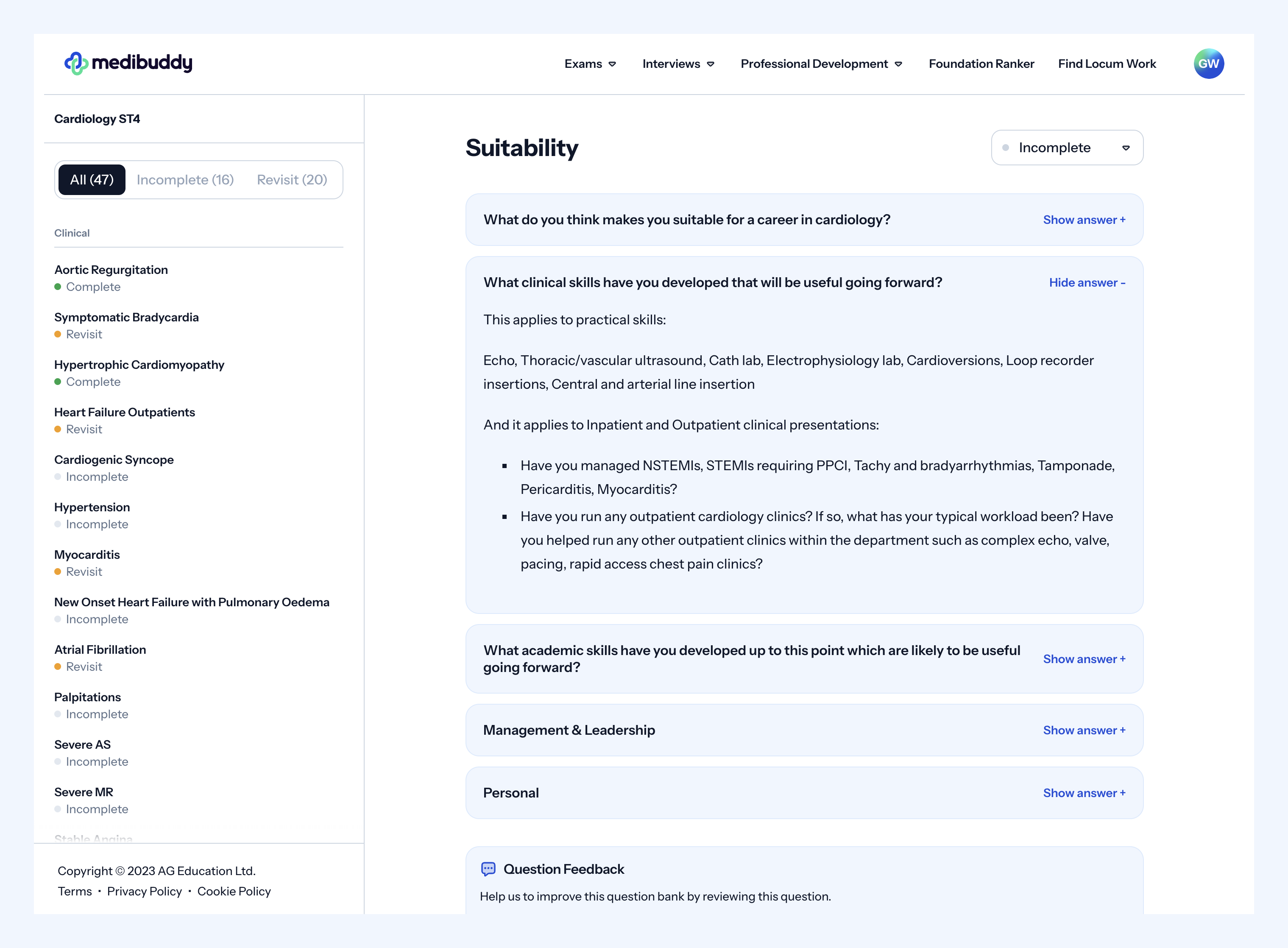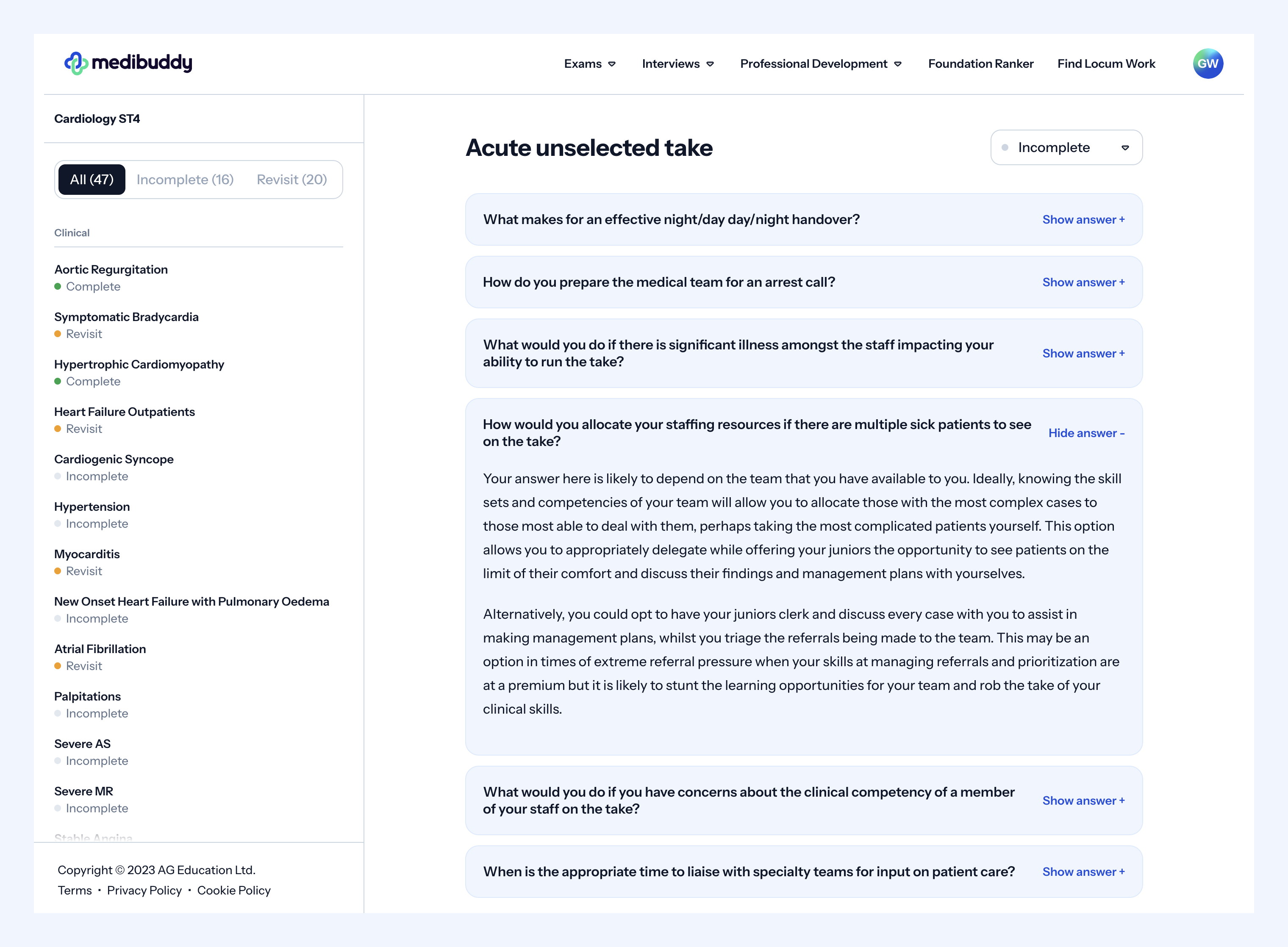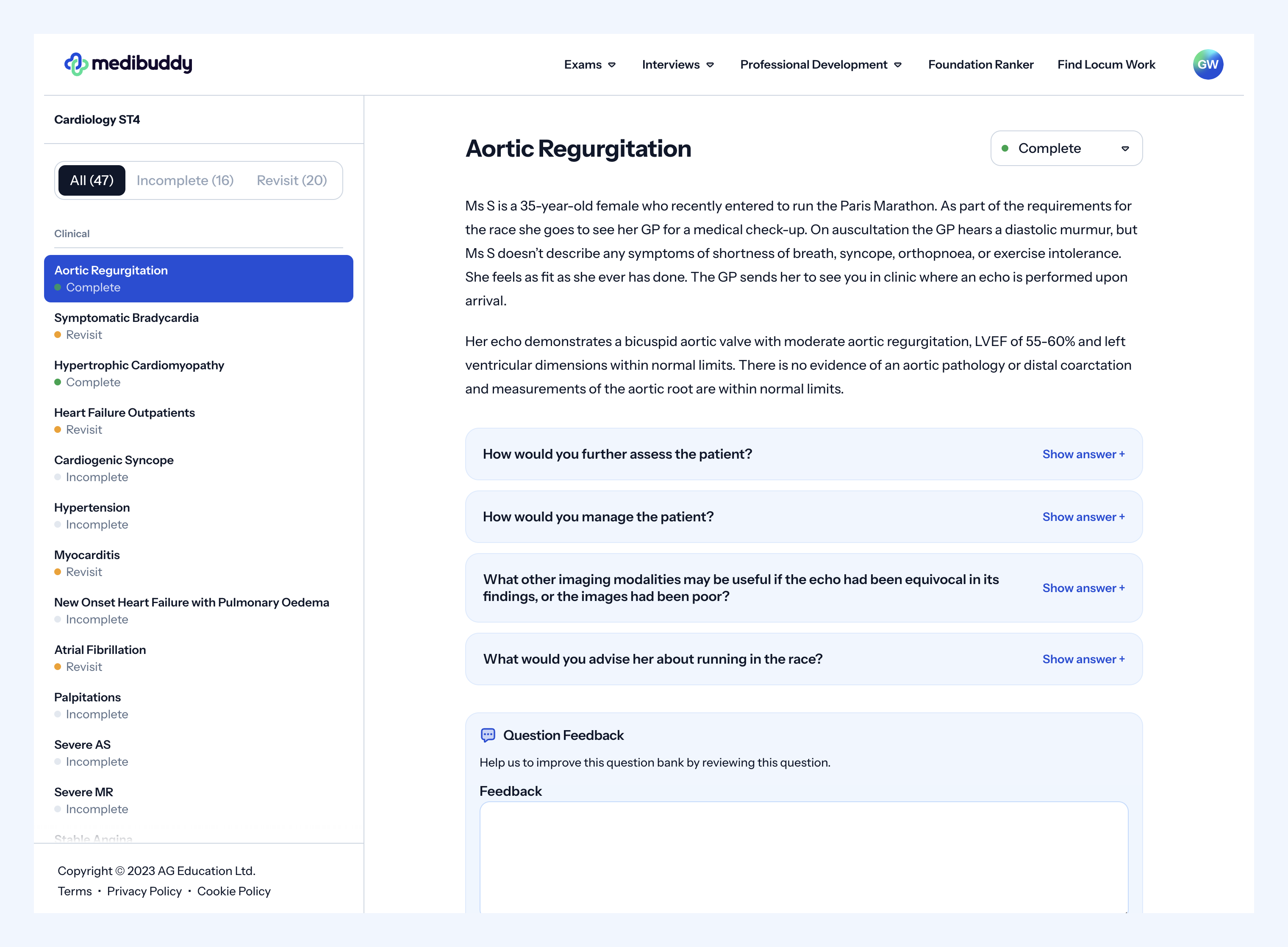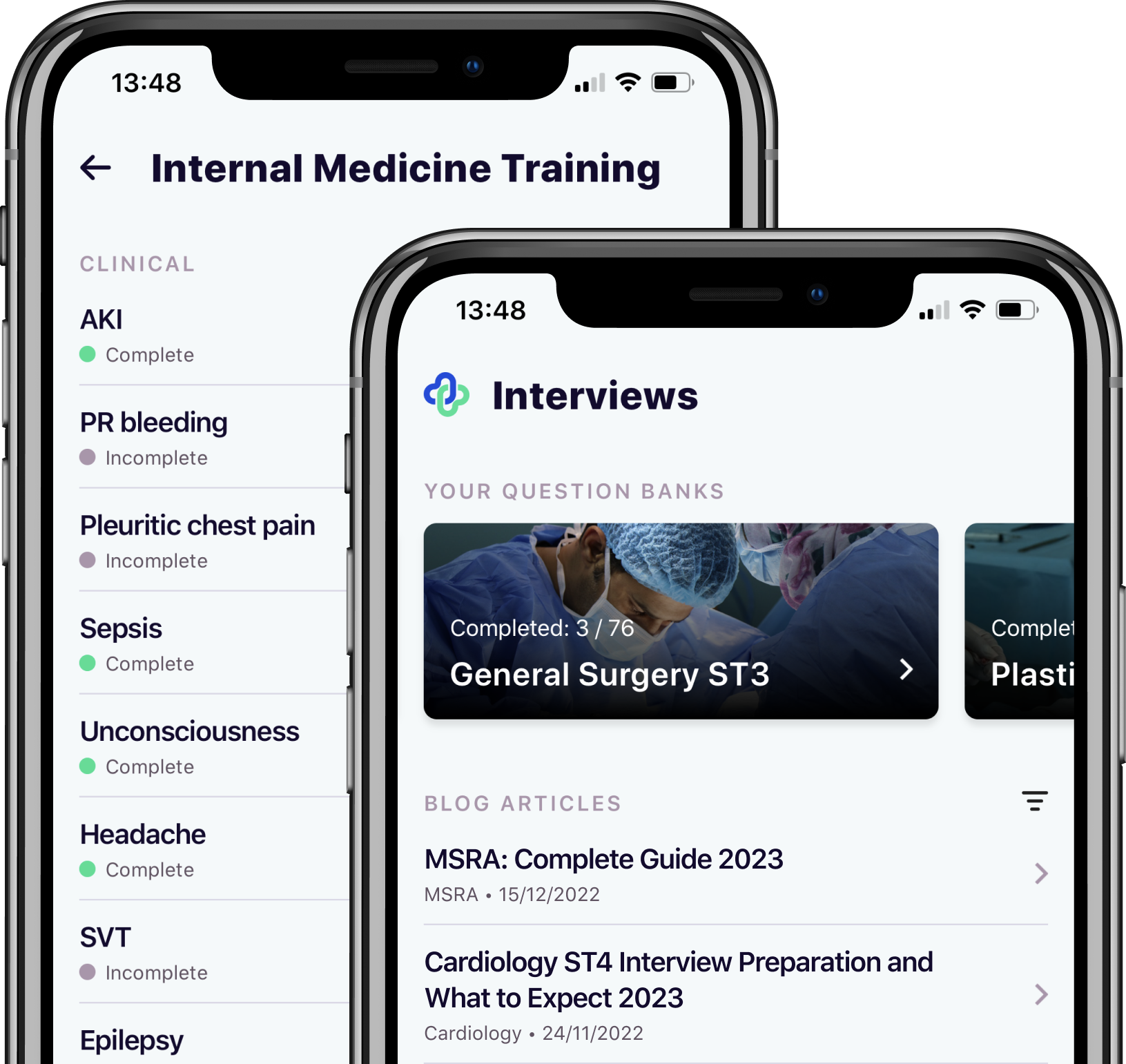
Cardiology ST4 Interview Preparation and What to Expect 2025
Core training was previously 2 years, however, it has since been changed to 3, so trainees enter cardiology training at ST4 level instead of ST3, as was the case previously.
Cardiology ST4 Applications
If you are applying to Cardiology ST4, you will first complete your application, which is made up of your self-assessment and submission of your evidence. The self-assessment offers 50 points across all domains and you must provide evidence for your achievements. Evidence can include certificates and letters of reference, and the key is that it is “sufficient for the reviewer to be confident that you have claimed correctly”. There are a further two marks available for if this evidence is well-presented. You can find out more about the scoring framework and evidence criteria here.
The evidence uploading window for 2025 is 30 December 2024 until 9 January January 2025, so make sure you have gathered all of your evidence prior to this, so you aren’t panicking or missing anything on the day.
Cardiology ST4 Interview
The Cardiology ST4 interviews are a highly competitive process which understandably causes considerable anxiety for candidates. In 2024, nearly 4 people applied for every post! However, there are several things that you can do to help you perform at your best. The aim of this article is to outline the interview process and to give some advice based on our personal experience and opinion. We’ve also produced our Cardiology ST4 Interview Question Bank to help you prepare.
For Cardiology 2025, the interview dates are as follows: 19th, 20th, 21st, 24th, 25th, 26th, March 2025, and this applies to all regions. The interview comprises two stations. Each station will last 22 minutes and the total interview will last around 50 – 55 minutes. Each of the five questions provide the opportunity to earn five points from each assessor. You’ll also be assessed on your communication skills throughout the interview, meaning there are six score areas in total.
Station 1 – Question 1: Suitability and Commitment
This section gives you the opportunity to answer the question: “Why are you the ideal candidate for cardiology training?” and allows you to build on the information you provided in your application form. The section varies slightly each year and will last around 10 minutes. Despite the changes in wording, every year its essence is the same and it is an opportunity for you to sell yourself and outline why you are suitable for cardiology training.
Most candidates will have very similar curriculum vitae: publications, presentations, audits/QIPS, research, clinical cardiology rotations during foundation or core medical training, cardiology specific courses (e.g. echocardiography courses), MRCP (or pending). Whilst it’s important to mention these, the point of this question is not to simply list your achievements or experiences as you did in your written application. You must qualify your achievements and relate them to cardiology, explaining how they will make you a better cardiology registrar.
For example:
- What did you do on your cardiology rotation that makes you suitable for cardiology? Did you manage outpatient clinics?
- What clinical skills did you practise or are competent in that are cardiology-specific?
- If you attended an echocardiography course, have you practised this on the ward, and are you able to acquire basic images?
- Did you spend time in the catheter lab, understanding coronary physiology, the practical aspects of angiography, and managing the complications associated with interventional cardiology?
- What did you learn from your research projects, or when writing or publishing your research? What skills did you acquire through these processes, and importantly, how will that be helpful to you in cardiology training?
- What audits or QIPs have you completed, and what will you be able to bring to the teams that you will join as a cardiology registrar?
You will appreciate from the questions above that the ten-minute slot should not be spent simply listing your experiences or achievements. It is imperative that you relate it to cardiology training, clearly demonstrating what you have learned and most importantly how you will be able to apply it to your specialist training.
Seven minutes is a very short time in which to do this. You must be economical with your words and make each one count for something. Try not to waffle. Similarly, it is important not to appear too rehearsed. For this reason, we recommend that you don’t write down your “speech” and read it out to the interviewers.
Ensure that you make eye contact, smile (even though you will be nervous) and come across as positive and enthusiastic, but not overly confident or arrogant. Remember, the interview is an opportunity for your future consultants to judge whether or not they would want you to work alongside them, so it’s important to come across well.
You should ensure you know your written application inside out and can qualify and explain everything in it. Here is an example of a Suitability and Commitment scenario from our question bank. We provide a range of questions for you to think about when preparing your answers for this station.

Station 1 – Question 2: Medical Registrar Suitability
In this section, there will be two short themes/questions provided to you by interviewers, and you will have approximately 7 minutes dedicated to discussing them. You will need to think about the non-clinical aspects of being a medical registrar.
This question focuses on two of the Capabilities in Practice (CiPs) from the Internal Medicine Stage 1 Curriculum:
- Managing an acute unselected take
- Managing a multi-disciplinary team including effective discharge planning
Think about examples from your experience in managing a team and caring for acute medical admissions, including scenarios you were faced with, how you managed them and anything you had learned.
Here is an example question and answer from our question bank. We recommend making notes as you work through the question bank, so you can tailor the answers to your experience.

Station 1 – Question 3: Ethical, Professionalism and Governance
The third section is based on professionalism and governance. These questions can be difficult to pre-empt and are given to you during the interview, so you do not have time to prepare beforehand. Our advice here would be to ensure that you understand clinical governance and the various activities that comprise this umbrella term (eg. teaching and training, audit, information technology etc.). Have examples of activities that you have been engaged in that demonstrate your understanding and participation in clinical governance. Again, it is important to not just list what you have done, but to explain your learning and how you would apply it to cardiology training.
We would also recommend reading GMC guidelines for doctors, including best practice, consent, confidentiality and mental capacity. Having some knowledge about the role of indemnity organisations like the MPS may also be helpful. It is possible that there will be scenarios similar to the situational judgement test (SJT) taken by final-year undergraduates and GP trainees during their application process. Irrespective of the scenario, your goal should be to demonstrate that you are sensible and safe, aware of the guidance and can quote some references (for example GMC guidelines).
Our interview question bank provides a number of example questions and answers for this section. As the questions can be quite difficult to pre-empt, we have produced over 50 questions to help you prepare and achieve maximum points in this section.
Station 2 – Questions 1 & 2: Clinical Scenario 1 & 2
For 2025, you will be given two clinical scenarios.
For the first clinical scenario, you will be given a clinical scenario to review for a few minutes. You will then be asked questions on this scenario for around 13 minutes. Remember, this is not an opportunity to tell the interviewers everything that you think you know about cardiology. Make sure you listen carefully to the questions and answer them concisely, ensuring you don’t deviate too far away from what has been asked.
The most important point for you to remember is to start with the basics and be safe. They want to know that you are competent and will work within the confines of your knowledge, without trying to do something that you are not yet trained to do. There is nothing wrong with suggesting investigations that you cannot perform, but we’d advise you to start with the basics. Try to put yourself in the scenario and say what you would do in real life. This question is designed to test your clinical acumen and judgement, so saying that you would do a coronary angiogram or insert a pericardial drain as your first response is unlikely to score you many points.
Think about the steps you would take. For example, start by saying you would take a history and examine the patient, managing them in a systematic and organised fashion. Your first priority would be to stabilise the patient and ensure basic tests are done (blood tests, ECG, urine dip, chest x ray, ensuring there is vascular access and a cardiac monitor). You would then inform other members of the team to organise specialist tests and management, so think about how you would communicate this. The point here is to emphasise that you are able to manage acutely and chronically unwell patients presenting with cardiovascular illnesses. You will be expected to have some knowledge of managing cardiology specific scenarios, for example post-angiography or post coronary syndrome complications, however, you should aim to demonstrate this knowledge once you have first covered the basics.
You should be aware of the NICE and ESC guidelines for common presentations such as stable angina, coronary syndromes, heart failure, hypertension, tachy- and brady-arrhythmia, syncope. You should also be aware of the cardiology specific investigations eg. echocardiograms, stress tests, CT coronary angiography, angiography and angioplasty, cardiac MRI etc. However, due to time limitations there are unlikely to ask you detailed questions about these so a general overview should suffice. Your goal should be to demonstrate you have knowledge of guidelines and are able to apply them to an unwell patient.
Remember, in order to score highly you need to answer the questions concisely, start with a basic management plan and then move to more complex tests and investigations. You must then demonstrate that you know when to escalate for help and can think laterally about the patient’s problems, ideas, concerns, and expectations.
For your second clinical scenario, you will be given a hypothetical scenario verbally, and asked questions on it for around 9 minutes. You should approach this in a similar way to the previous clinical scenario, thinking about steps you would take, potential treatments, further information you would gather, and how you would communicate with those involved in the scenario.
Below is just a snippet of some of the clinical scenarios we include in our cardiology interview question bank.

We hope that the above has been useful in outlining the interview process, and has given you an insight into what you may expect. Of course, interview formats and their content can change, and your own experiences may differ from those noted above, so each year we collect feedback from interviewees to ensure our resources, including our interview question bank, are as up-to-date as possible. You can be confident that the same principles will apply to your interview and hopefully, you will find our advice informative and useful.
If you have read this blog, but aren’t actually sure if Cardiology is the specialty for you, you can check out our Life as a Cardiology ST4 blog which will give you an insight as to what to expect from the specialty.
Good luck!

Take your subscriptions with you
Our mobile app allows you to access your interview and exam question banks wherever you are.



